Key takeaways:
- Recovery involves both physical and emotional healing, emphasizing self-compassion and recognizing that the process is not linear.
- Rest, sleep, and nutrition are critical for recovery; prioritizing these elements can significantly impact mood and energy levels.
- Seeking professional guidance, including mental health support and nutrition advice, enhances the recovery experience and provides valuable coping strategies.
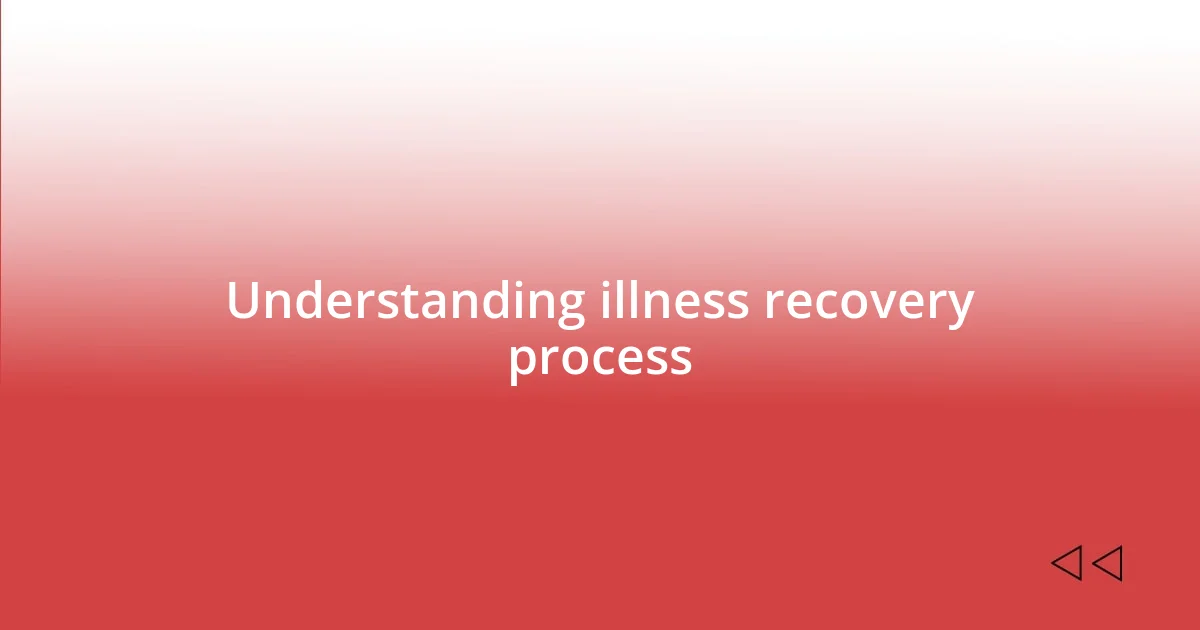
Understanding illness recovery process
The illness recovery process is often a journey filled with ups and downs. I vividly remember a time when I was recovering from a severe flu. Each day felt like a mini-triumph as I celebrated little victories, like finally managing to eat a full meal or take a short walk outside. Have you experienced the same sensation of joy in your own recovery moments?
Understanding recovery requires recognizing that it’s not just about physical healing; emotional well-being plays a crucial role too. I once found myself feeling a wave of sadness during my recovery, and I realized that addressing my mental state was just as important as overcoming the illness itself. Have you ever faced emotional challenges when healing, perhaps feeling isolated or misunderstood? That connection between the mind and body is often overlooked but can truly shape our recovery experience.
Different people experience recovery at varying paces, and it’s essential to be kind to ourselves during this time. There were days I felt guilty for not bouncing back faster, but I learned that this process isn’t linear. Have you ever felt pressured to move on quickly? It’s perfectly natural. Embracing the ebb and flow of recovery, with its challenges and triumphs, allowed me to find a gentle understanding of my own pace.

Importance of rest and sleep
Rest and sleep are often undervalued elements in the recovery process, yet they are crucial for healing. I learned this the hard way during a particularly exhausting illness. On days when I prioritized sleep, I noticed a marked improvement in my energy levels and mood. Have you ever noticed how a good night’s sleep can change your outlook completely?
Another aspect is that rest isn’t just about physical recuperation; it’s also a time for mental restoration. I remember feeling overwhelmed by anxiety after a long illness, but during periods dedicated to quiet reflection or light reading, I found that I could gradually ease that tension. This mental break was just as important for my overall recovery. Have you considered how rest can also nurture your emotional health?
Lastly, the quality of sleep can’t be overlooked. I’ve found that creating a comfortable environment, limiting screen time, and practicing relaxation techniques significantly enhanced my ability to sleep well. It’s fascinating how small adjustments can lead to profound changes in how we feel. What strategies have you used to ensure restful sleep during recovery?
| Factors | Impact on Recovery |
|---|---|
| Rest | Supports physical healing and emotional stability |
| Sleep Quality | Enhances mood and cognitive function |
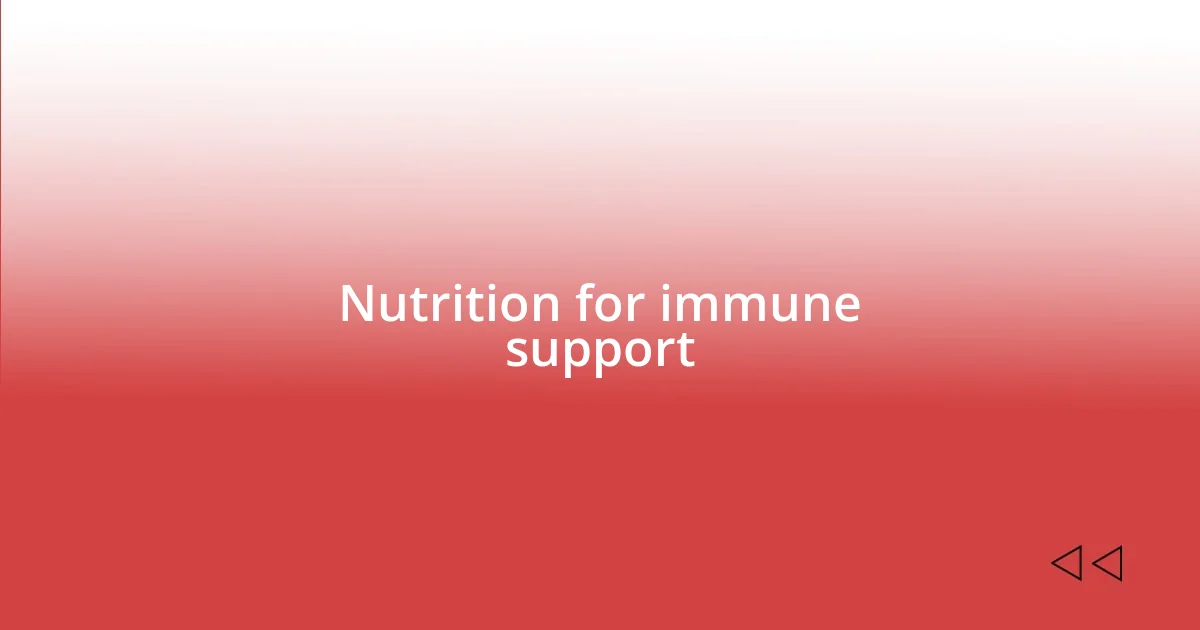
Nutrition for immune support

Nutrition for immune support
Nutrition plays an indispensable role in supporting our immune systems, especially during recovery. I vividly recall the first days of my last illness when I struggled to eat anything beyond plain toast. But once I gradually introduced more nutrient-dense foods into my diet, I began to feel a remarkable shift in my energy levels and overall resilience. Have you ever noticed how food can either nourish or deplete your body during tough times?
When it comes to immune support, certain nutrients stand out. Here are some key players that I’ve discovered to be incredibly beneficial:
- Vitamin C: Found in citrus fruits, it supports the immune response and helps repair tissues.
- Vitamin D: I learned that getting some sun or taking a supplement can boost immunity significantly.
- Zinc: A vital mineral that contributes to immune function, often found in nuts and seeds.
- Antioxidants: Foods like berries or dark leafy greens help reduce inflammation and support overall health.
Consuming a color-rich plate is always something I strive for. I remember one recovery day specifically; I made a big salad loaded with varied vegetables and topped it with seeds. Aside from the physical nourishment, that burst of colors and flavors felt uplifting. Have you ever experienced how visually appealing food can enhance your mood during tough phases? It’s not just about filling our stomachs; it’s about feeding our spirits too.

Hydration and its benefits
Hydration is a fundamental aspect of recovery that I truly appreciate. I remember grappling with dryness during a previous illness, and it felt like a weight on my chest. Sipping water regularly transformed my experience—suddenly, I felt lighter and more alert. Have you ever felt how something as simple as drinking water can lift your spirits?
Not only does proper hydration help in flushing out toxins, but it also supports essential bodily functions. I’ve found that staying hydrated shortens recovery times by helping to transport nutrients more efficiently. The days I focused on hydration, I noticed my headaches and fatigue faded, making space for clearer thoughts and energy. Isn’t it fascinating how a clearer mind can uplift your mood and resilience during tough times?
Moreover, I’ve learned that hydration doesn’t just come from drinking water. Herbal teas and broths became soothing staples for me. They warmed me up and provided a comforting ritual that I looked forward to. It’s surprising how those little moments of nourishment and care can be so enriching. What creative ways have you found to keep hydration enjoyable during your recovery journey?
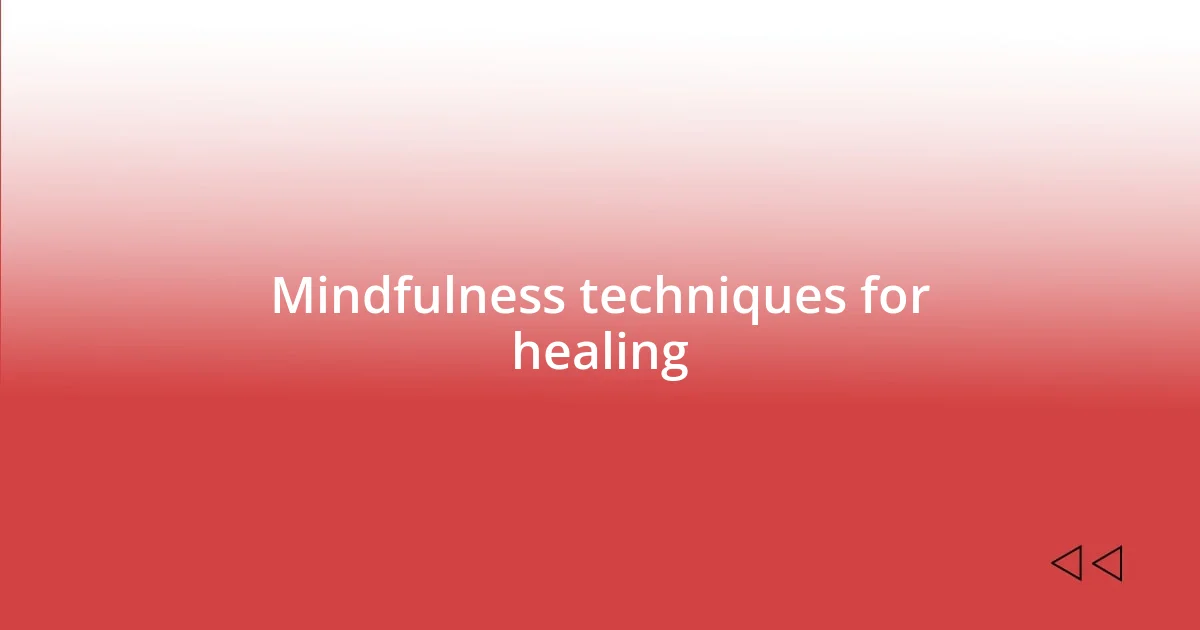
Mindfulness techniques for healing
Mindfulness techniques have become an essential part of my healing process. One technique that really resonates with me is focused breathing. During my recovery, I often found myself overwhelmed with anxiety and discomfort. I learned to take just a few minutes to close my eyes, inhale deeply, and exhale slowly. This simple practice made a noticeable difference in my stress levels—it’s amazing how just tuning into your breath can bring a sense of calm. Have you tried focusing on your breath when you’re feeling unwell?
Another method that I embraced is body scanning. At first, it seemed a bit strange, but I discovered that by mentally checking in with each part of my body, I could acknowledge any discomfort without judgment. There’s something powerful about this practice—I recall lying in bed, visualizing each area from my toes to the crown of my head, and it helped me release tension. It turns an anxious mind into a more compassionate one. Have you ever paused to really connect with how you’re feeling physically and emotionally?
Gratitude journaling also played a significant role in my recovery. Every night, I would jot down three things I appreciated that day, no matter how small. On days when getting out of bed felt like a victory, celebrating that achievement brought a sense of hope. I remember one entry where I wrote about the warmth of sunshine streaming through my window—a simple yet profound moment that reminded me of life’s beauty. Have you ever noticed how reflecting on gratitude can shift your perspective during challenging times?
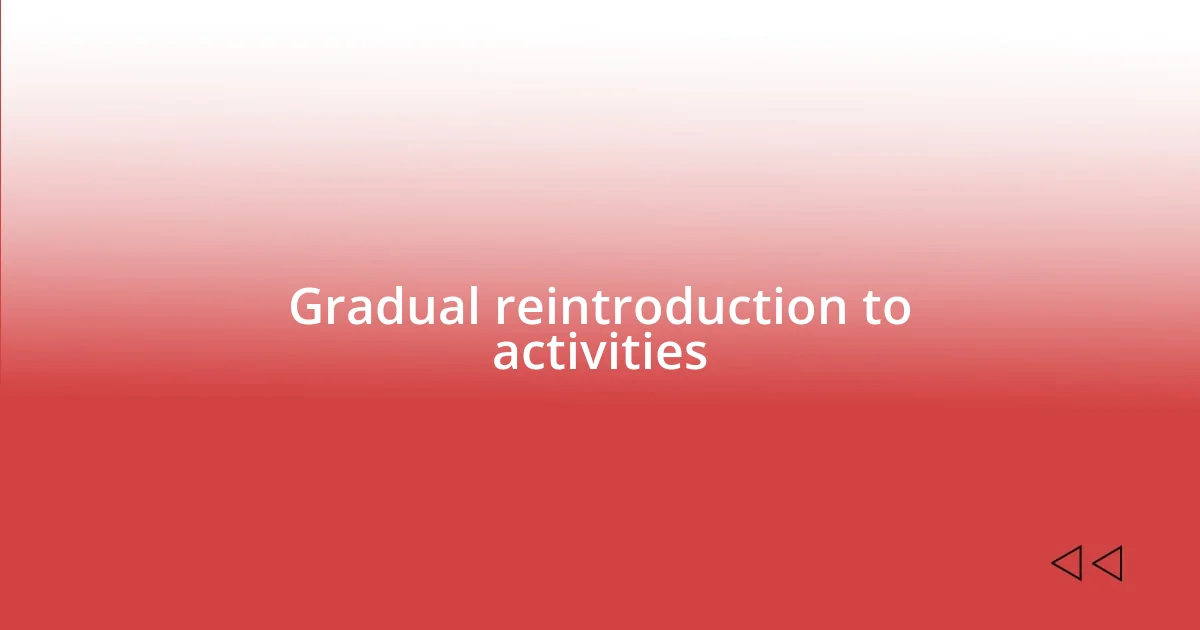
Gradual reintroduction to activities
Reintroducing activities after illness is a delicate balancing act. I recall the first time I tried to walk around the block after a prolonged period of resting. My body protested, and I felt a mix of pride and frustration as I realized that even a small step took considerable effort. It taught me that embracing small victories—like taking a few laps around my yard—was essential. Have you experienced that rush of accomplishment when you’ve pushed through just a little more than you thought you could?
During recovery, I found that setting manageable goals was vital. I made a schedule that included short bursts of activity interspersed with plenty of rest. This gradual approach allowed me to gauge how my body reacted without overwhelming it. Each week, I bumped up my activity just a notch—whether it was 5 more minutes of yoga or one more errand. It was liberating to witness my progress. Have you ever tracked your recovery like this? It might surprise you how motivating it can be.
Listening to my body became my most crucial guide. I learned to differentiate between healthy fatigue and signs of overexertion. On one particularly exhausting day, I had planned to tackle a whole afternoon of chores, but midway through, I sensed that familiar fatigue creeping in. Instead of pushing through, I took a step back and paused. I realized that honoring my limits wasn’t a weakness; it was a key to long-term recovery. What strategies have you implemented to truly hear what your body needs?
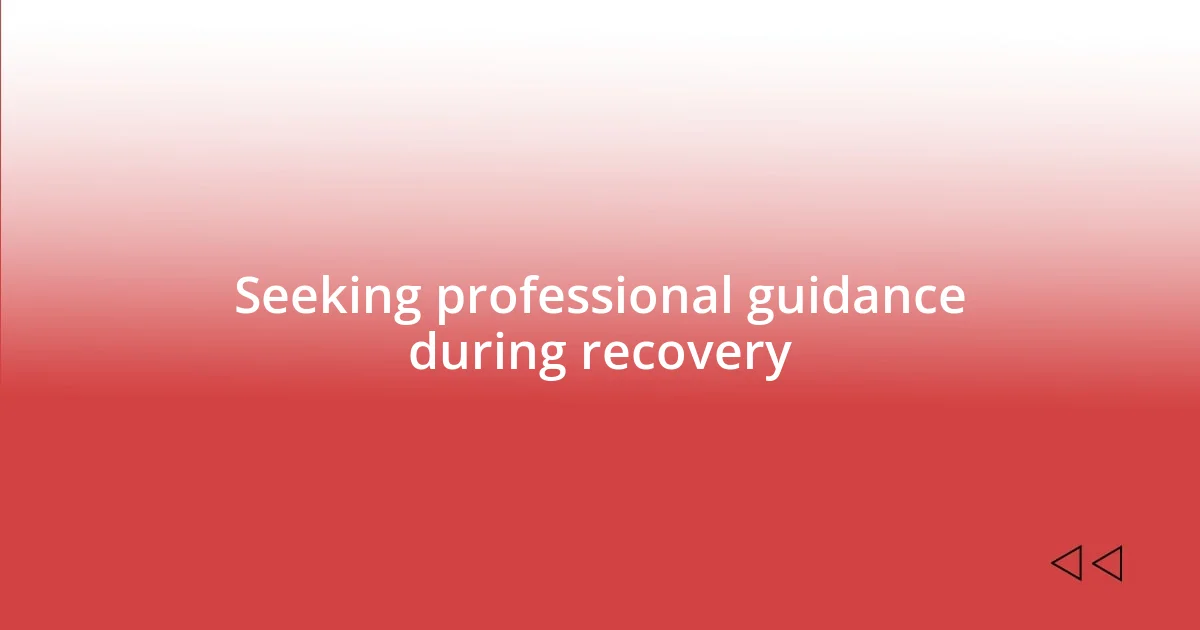
Seeking professional guidance during recovery
Seeking professional guidance during recovery has been invaluable for me. Early on, I consulted a healthcare provider who specialized in recovery support, and their insights truly shaped my journey. I remember one particular appointment where we discussed my symptoms in detail; it was a relief to have someone validate what I was feeling. Have you ever felt that sense of reassurance when a professional listens to your concerns?
Connecting with mental health professionals also played a crucial role in my healing. I recall my first therapy session after my illness—at that moment, everything felt overwhelming. The therapist taught me coping strategies tailored to my needs, transforming my perspective on recovery. This support not only boosted my emotional resilience but also encouraged me to express my feelings openly. Have you considered how a professional’s guidance could provide clarity amid confusion?
I’ve also learned the importance of interdisciplinary support. I found it beneficial to have a team that included not just a doctor, but also a nutritionist and a physical therapist. This diverse approach helped me tackle various aspects of my recovery that I hadn’t even considered initially. Remember the time I felt lost in my dietary choices? The nutritionist’s expertise on healing foods was like a lightbulb moment for me. What kind of professional support do you think could enhance your recovery experience?















